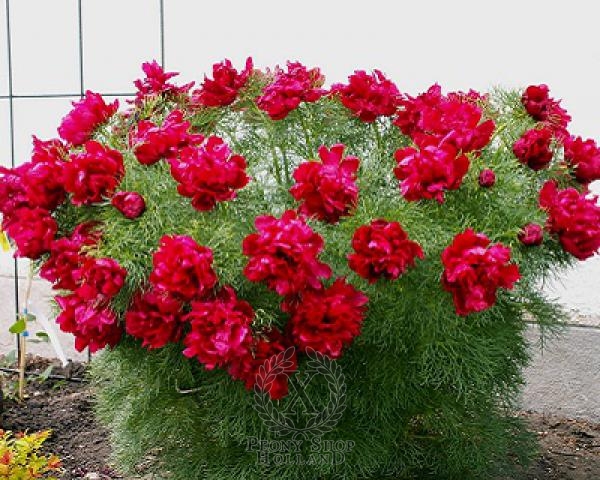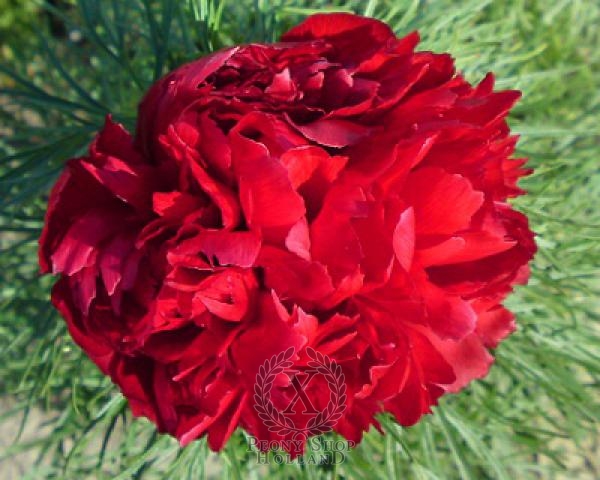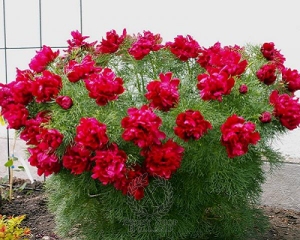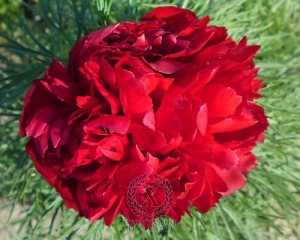Peony Tenuifolia Plena
| Size | Weight |
|---|---|
| 3/5 eye | 150 gram |
Peony Tenuifolia Plena is one of the many special double red Tenuifolia Peonies that we grow at Peony Nursery Peony Shop Holland. This lovely dwarf peony with finely cut leaves is a very nice garden plant.
Rock Garden Peonies
Peony Specie Tenuifolia Plena belongs to the Rock Garden Peonies These rock garden peonies are the shortest varieties we grow! Very charming, herbaceous perennials, our rock garden peonies have foliage, texture and blossoms sized in perfect proportion to their smaller stature. Rock-garden varieties are named for their short heights (generally below 21") and their adaptability for today's smaller landscapes and gardens.Peony Soil
Peonies love good drained rich organic nutritious soils. Over the years we have developed a tedious process for growing the highest quality of peonies possible. As our company is located in the northern part of the Netherlands, we are blessed and cursed with a heavy clay soil. On the one hand side this soil is perfect for peony growth and therefore nature helps us to grow the biggest, highest quality peonies fast. On the other hand the clay ground forces us to take extensive measures before storing or exporting the peony roots. For cut-flower production it doesn't matter, once planted they enjoy the rich nutritious clay soil and become to compare with sand soils,, not only stronger as plant in general, but also much faster into production and shown bigger size Peony heads!
Peony planting of Tenuifolia Rubra Plena
Peonies can be planted manually or mechanically. We have chosen to plant our Exclusive Peonies manually and the other Peonies by machine.
Before planting the peonies, the soil needs to be prepared well. This is a crucial element in the peony growing process. First the soil where the roots is grown needs to be properly flattened and drained in order to prevent potential water damage (from heavy rain).
After having cultivated the land properly (with a milling- or spade-machine) the roots are to be planted at a depth of 2 - 3 cm. This depth is very decisive because if the roots are planted too deep, the production of flowers will diminish or even completely vanish. The distance between the cuttings depends on the variety. Some varieties need more or less space than others. Furthermore, the time-period that roots will remain on a particular spot has to be taken into consideration as well.
Fertilizing and Weeding the Peonies
Peonies must be fertilized during the winter months. There is no rule to the amount of usage of each element (Nitrogen, Phosphorus, Potassium), because this depends on the nature of the soil. Peonies flourish best on soil with a pH from 6 to 7.
During the winter season chemicals against weeds can be used as well. It is important to do this during the cold season, because then the roots are at "rest" (dormant). Otherwise the roots are apt to absorb the chemicals which will cause damage to the peony.
When the young root starts growing in spring several kind of preventive fungicides can be used. This can be persisted until two weeks before harvesting.

Theo is about to 'feed' the peonies
Upcoming of the Peonies in Early Spring
When the first Peonies show up in February / March, the use of wind fences can be most helpful to protect the still vulnerable peony plants. The fences are usually placed from the east to west to keep the cold northern wind out.
No gates are placed from south to north because that allows the wind to keep the plants dry and prevent the spread of Botrytis. When the plants are still small and vulnerable to diseases, copper sulphate can be used to ensure a firm and healthy plant. Several fungicides can be used to protect the plants against Botrytis (preventive).
Mowing the Peonies
The mowing of peonies takes place at the end of August. It is very important that all dead organic material is removed because all kind of diseases lives in dead organic material.
This material can be gathered by a tractor with a sweeping tool attached or by hand with picking forks. The last remains must always be removed manually.
About peony nursery "Peonyshop.com" Lutjebroek, the Netherlands
Peony farm Scholten - Keeman at this point specifically focuses on expanding exceptional, very high leading peonies. This very specific focus wasn't always the case. The corporation comes with a wealthy history starting off in the year 1875 along with Simon Scholten who has been growing greens for a full time income.
In 2001 the particular company put together their unique modern marketing and advertising-name & logo design "Peonyshop.com" and consequently they started off focusing on improving exclusive peonies. Within the year 2002 this company opened up their very own shop on the web", the: peonyshop together with Peonies & Buxus. Throughout 2003 Joshua Scholten began with multiplying peonies. Than in year 2004 the business began to foreign trade peonies from the Netherlands all over Europe, America and also Asian countries.
Right now our own peony nursery is focused on maximizing and spreading unique, premium quality peony roots that happen to be sold and exported to everywhere around the world. Additionally we even reduce peonies predominantly serving the Dutch peony flower sector.
The things we pride:- The premium quality of our own products
- Our potential to foreign trade world wide
- Our own enormous collection peonies like Tenuifolia Plena (double)
- The peony crame of substantial potential seedlings
About growing Tenuifolia Rubra Plena (double) peonies
The fall season happens to be the right period of time regarding growing a peony plant. All the peonies are usually extremely long-lived plants sustaining approximately 50 up to seventy yrs, so right after an individual have the peonies placed in the correct manner, you is going to enjoy them for a long time. Peonies like a sun-drenched place together with a well-drained soil. A good air flow circulation presented around the plant is also essential. These kind of environs assist this type of plants to avoid sickness problems. To arrange the seeding hole for a bareroot peony plant, dig the dirt to a depth around 12-18". Make use of garden tools to loosen the sides of the particular seeding hole as well. It's actually really important that the particular "eyes", or growth nodes, situated near the base of the old stem, end up no more than 2 " under the ground surface.




